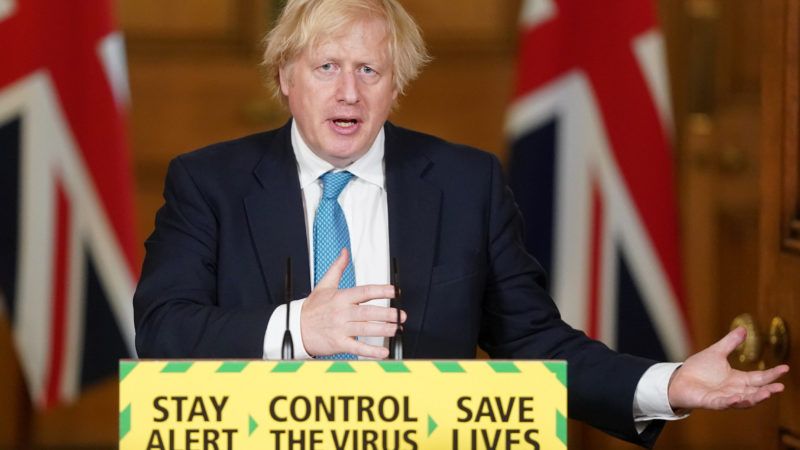As Britain Prepares to Fully Reopen, Americans Should Listen to Boris Johnson's Message
Individuals, not governments, will have to take charge of the next phase of the coronavirus response. That means more freedom, but also more personal responsibility.

Seemingly borrowing a few bits from American political history, British Prime Minister Boris Johnson on Tuesday declared that his nation's "long national hibernation" would be coming to an end on July 4.
While some public spaces—including nightclubs, casinos, tattoo parlors, gyms, and more—will continue to be closed by government order, the U.K. plans to lift government-mandated shutdowns of restaurants, hotels, theaters, hair salons, libraries, zoos, and amusement parks at the end of next week. More, and larger, family gatherings will be permitted. Most important of all, perhaps, is the announcement that pubs will be allowed to open for the first time since mid-March.
https://twitter.com/NoveltyBobble12/status/1275400368260812800
Britain's plan to reopen after three months of COVID-19 lockdowns is not so different from the phased-in reopenings that many American states are now implementing. But Johnson's speech to Parliament on Tuesday does offer some useful advice that Americans—both ordinary citizens and public officials charged with managing the pandemic and its economic fallout—should keep in mind.
In allowing more businesses to open their doors, Johnson said that the government's "principle is to trust the British public to use their common sense in the full knowledge of the risks, remembering the more we open up, the more vigilant we need to be."
It's that two-sided approach—one that recognizes both personal freedom and personal responsibility—that has seemed, at times, to be missing from America's coronavirus response. Indeed, much of the debate over whether the U.S. should open up or remain closed missed the essential point: namely, opening up is impossible without safety precautions to prevent deadly outbreaks, and staying closed forever is economic suicide. Governments literally cannot keep people cooped up inside their homes indefinitely, but people won't voluntarily venture out to work and play until they believe it is safe to do so.
To that end, Johnson said the British government's role would shift to one of "guidance, not legislation."
That's a significant shift, particularly given the sometimes heavy-handed—and often clumsy—approach that Britain took during the early stages of its coronavirus response. A law passed by Parliament in March enforced shelter-in-place requirements with fines as large as 960 pounds (about $1,200) for repeat offenders. Some hair salons have been investigated for opening in contravention of the national shutdown order.
The British state will still play a role after July 4. Part of Johnson's reopening plan calls for pubs and restaurants to keep a list of patrons in case contact tracing is needed.
Acknowledging that governments must trust people to use common sense is the only realistic way forward—in Britain as well as in America. That means governments should do things like encouraging people to continue social distancing, empowering businesses to protect their own property rights by requiring masks, and discouraging large social gatherings like sporting events or protests.
Britain's experience with COVID-19 has been brutal. There have been more than 42,000 deaths there, which is more than any country besides the United States and Brazil, according to data from Johns Hopkins University. Johnson himself was briefly hospitalized in April after contracting the virus.
That Johnson now recognizes the limits of state power, even in the face of such statistics, and is shifting strategies accordingly, is an encouraging sign. It demonstrates that even leaders who bungled the initial response to the pandemic can still act to rebuild public trust by acknowledging that individuals, not governments, will have to take charge of the next phase.

Show Comments (25)